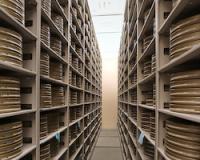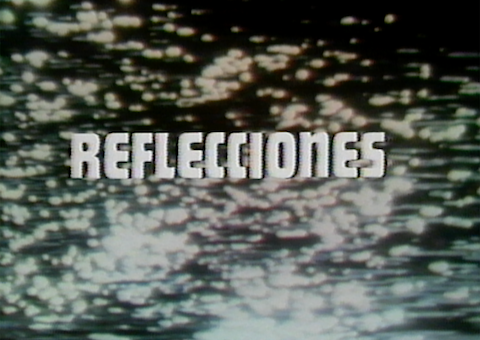
Guest writer Marley Saldivar-Lozano is a second year UCLA student in the Master of Library and Information Science degree program with a specialization in Media Archival Studies. She is currently a Vault Reconciliation Assistant at the UCLA Film & Television Archive. She is deeply interested in television history, as well as advancing accessibility and awareness of 1960s–70s Chicana/o/x programming.
Originally broadcast on Los Angeles television station KABC, Reflecciones (1972–74) was a revolutionary local public affairs program that provided Chicana/o/x and historically marginalized communities with a platform to tell their stories, and counteract harmful narratives ubiquitous across commercial television. Episodes highlight subjects that remain underrepresented in our collective memory such as the significant participation of Chicanos in the Vietnam War, and touch on social issues that continue to impact our society today, such as U.S. immigration policy, the criminalization of individuals experiencing drug problems, and rising unemployment rates. With this, the series holds extreme historical and socio-political significance for Chicanas/os/xs, Los Angeles and American cultural history at large.
UCLA’s relationship with Reflecciones first began in the 1970s. After filming “Chicana/o/x Librarianship and Information Services in California” and speaking with Chicana/o information professionals, producer Tony Rodriguez transferred the program from 2 in. to 3/4 in. U-Matic tapes in order to preserve the program for future generations. According to UCLA Distinguished Professor Chon Noriega, the tapes were then donated to the Mexican Librarianship Program at California State University, Fullerton, before being transferred to the UCLA Chicano Studies Research Center (CSRC) in the mid-1970s. They remained at the CSRC for decades, until they were relocated to their present home at the UCLA Film & Television Archive in the early 2000s. With funding from the John H. Mitchell Television Preservation Endowment, the Archive preserved all videotapes in the collection, and in April 2025, episodes were published to the UCLA Library Digital Collections platform for public viewing.
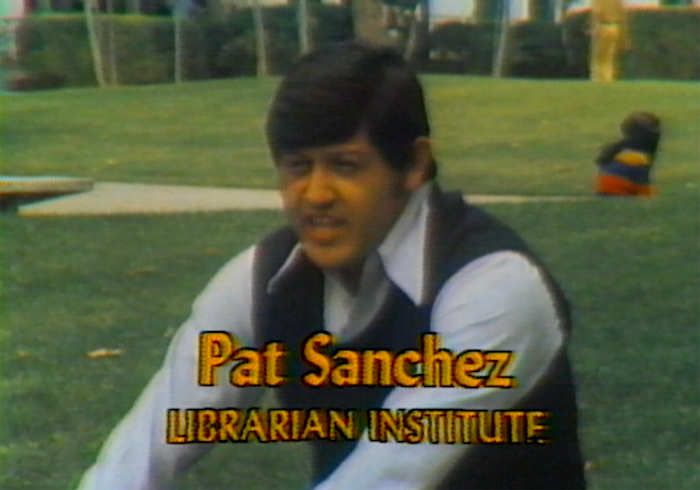
Episode: “Chicana/o/x Librarianship and Information Services in California”
I was first introduced to Reflecciones in a television history course during my first quarter in the UCLA Master of Library and Information Science (MLIS) program. With a strong interest in television and Chicana/o/x media, I was curious if there were any programs that incorporated these two interests. After speaking with Mark Quigley, John H. Mitchell Television Curator at the UCLA Film & Television Archive, I learned about Reflecciones and never turned back. As I learned about the production history, watched episodes and spoke to Chicano filmmakers and academics about the program, I was moved by the community solidarity and activism behind it. This passion only grew with time. Thus, when I was offered the chance to work with Quigley, the Archive and UCLA Library’s Digital Library Program to create new descriptive metadata, I jumped at the opportunity.
Originally, all digitized episodes of Reflecciones featured their original descriptive metadata on the UCLA Library Digital Collections platform. This included episodic summaries with minimal and, in some cases, incorrect information, outdated language and broad titles. To address these issues, I created new titles, summaries and production credits to ensure all communities were represented accurately and ethically and to improve discoverability for researchers. I viewed all 56 episodes in the collection, took comprehensive notes and composed new detailed summaries. Each summary includes the names of all interviewees to ensure community activists, filmmakers, artists and organizations are properly acknowledged. I worked closely with Quigley during this process to ensure all summaries followed the Archive’s ethical language standards and contained sufficient content. Following this, I developed new titles to better reflect the contents of each episode and noted production credits to highlight Chicana/o/x filmmakers who were integral to the success of the program. Notably, original metadata was preserved and is still viewable online to make the program’s history accessible to users.
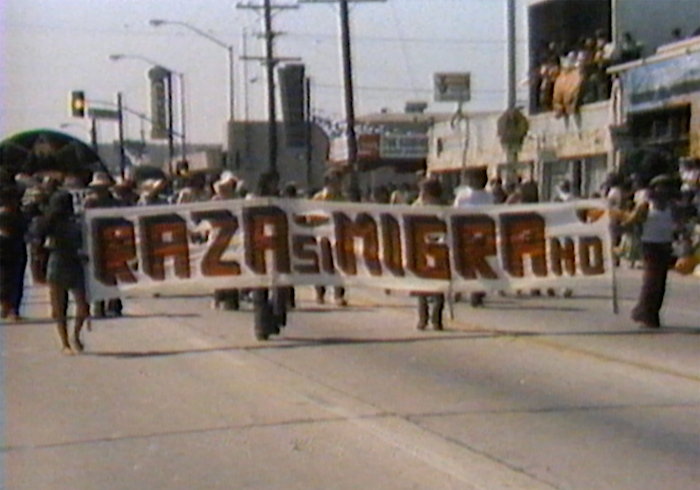
Episode: “Celebraciones: East Los Angeles Mexican Independence Day Parade & Feria de La Raza”
In the opening interview of “Chicana/o/x Librarianship and Information Services in California,” Robert Haro, assistant librarian at the University of Southern California (USC), is asked about the importance of preserving Chicana/o/x history. Haro, one of the few Chicano librarians in the 1970s, emphasizes the need “to capture the culture of the Chicano and to preserve it; because as long as the information about the Chicano, who [they are and] what [they represent], is not kept … then there is no way for future generations to understand what constitutes the makeup of the Chicano.”
Haro’s powerful words represent a philosophy that has shaped my understanding of the world. As the child of Chicana/o activists, I learned about my cultural roots through oral histories, film, literature, music and public art. The community was my teacher, revealing a history that my textbooks erased or minimized to a five-year period. Without the tireless work of Chicana/o/x activists, educators, historians and artists in preserving Chicana/o/x culture, I would not understand myself or my family history. Like The Great Wall of Los Angeles (1978), Reflecciones is a manifestation of this work and a powerful Chicana/o/x archive that can be used to learn more about socio-political and cultural history.
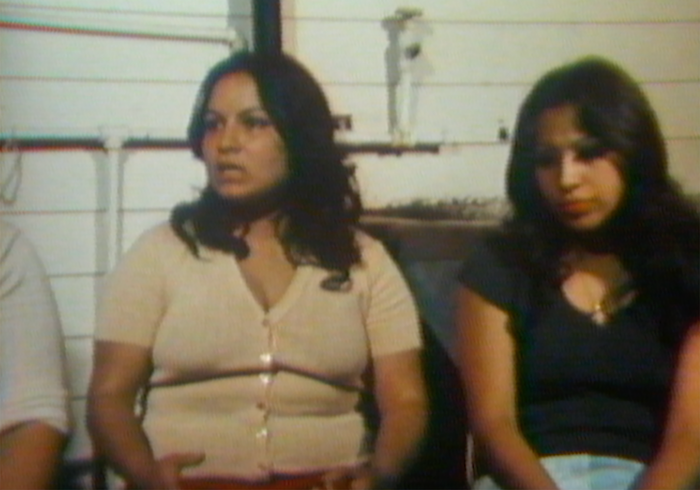
Episode: “Placa, Part 3: Chicana Juvenile Gangs and California Youth Camps”
With multi-generational connections to Chicano culture, numerous episodes reflect my family history in Los Angeles. For instance, several stories recounted in “Placa, Part 2: Chicano and Black Juvenile Gangs” reflect the experiences within my maternal family that grew up in a barrio with a Chicano gang subculture. In this episode, Chicano gang youth discuss the significance of graffiti art, how gangs are chosen families, and systemic inequities within their communities. The filmmakers use minimal cuts or prompts, allowing the youth to guide the conversation, often panning the camera quickly to capture off-frame comments. This approach humanizes juvenile gang members and pushes back against their criminalization in mainstream media, a rarity for 1970s television.
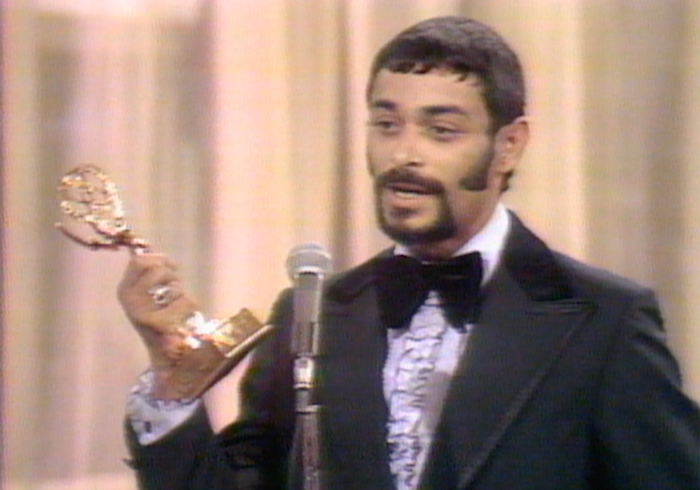
Episode: “Operación Navidad / Las Posadas / Reflecciones at the Emmys.”
As an emerging Chicana moving image archivist, working with this collection has been a privilege. On a professional level, it has taught me archival skills that will be useful in my career like composing descriptions for moving image materials, organizing metadata and conducting historical research. On a more personal level, it has made me reconnect with my roots and feel immensely proud to be a Chicana. In a time in which immigrants, Chicanas/os/xs, Latinas/os/xs and historically marginalized groups are being criminalized, I hope this show can inspire viewers to be proud of their heritage and find their voice, just as Chicana/o/x filmmakers did in the early 1970s.






 Mobile Navigation
Mobile Navigation
